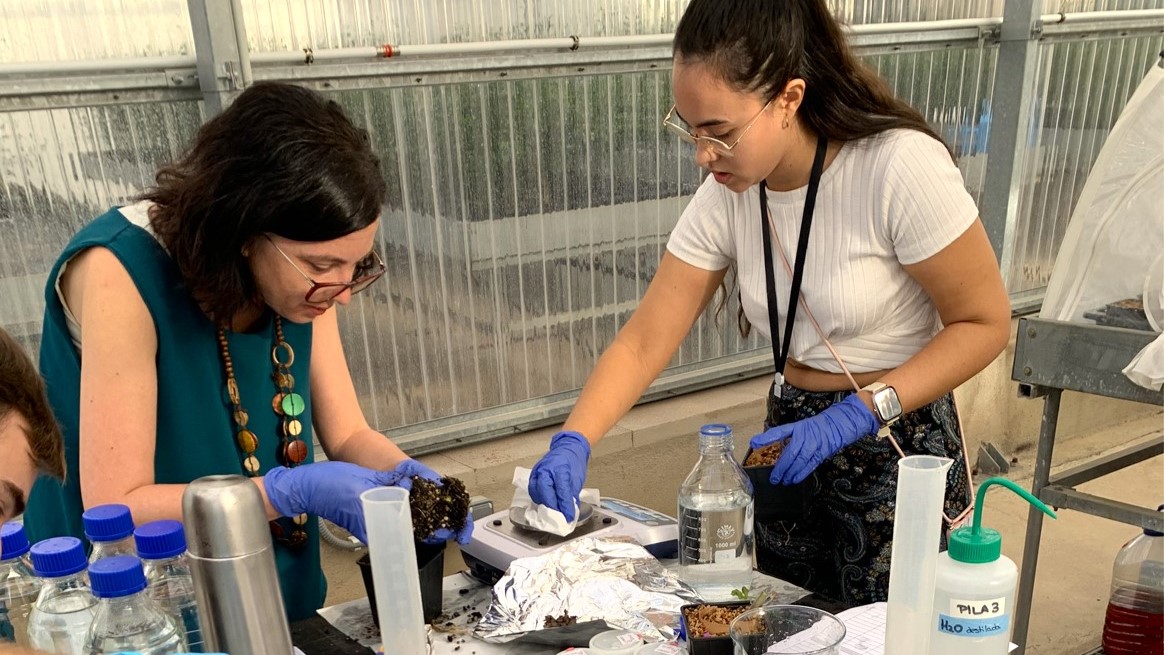Research staff from the Universitat Jaume I (UJI) of Castelló and the Institute of Agrochemistry and Food Technology (IATA-CSIC), located in the scientific-academic area of the University of Valencia Science Park, have developed the ActiBioMulch project, with the aim of providing the agricultural sector with more sustainable plastics and with an active role in combating pests
The research project, coordinated by Luis Cabedo Mas, professor at the Universitat Jaume I of Castelló and José María Lagarón, scientist at the Institute of Agrochemistry and Food Technology (IATA-CSIC), located at the University of Valencia Science Park (PCUV), develops a biodegradable and agrocompostable film that is able to encapsulate and release bioactive agents that provoke an immune response in crops and thus reduce the use of pesticides and plagicides.
The main contribution to the circular economy of this project, called Development of an active and biocircular agricultural mulch film (ActiBioMulch), is to provide the agricultural sector with more sustainable plastics and with an active role in combating pests. This mulch film that is being developed thanks to this work will be agrocompostable, that is, it will not produce micro or nanoplastics. Thus, with the generation of this new plastic for agricultural use, the use of traditional plastics and biocides will be drastically reduced in agriculture, which will prevent the degradation and contamination of soil and water, as well as the introduction of these compounds into the food chain.
The impact on the environment and agriculture of the use of controlled-release molecules will represent a breakthrough in the fields of Biology, Biochemistry and Plant Physiology because plants are constantly exposed to different stresses. Likewise, the fact of having a relatively constant inducing concentration will allow a greater efficiency in the defensive response, through sustainable treatments.
The main contribution to the circular economy of this project, called Development of an active and biocircular agricultural mulch film (ActiBioMulch), is to provide the agricultural sector with more sustainable plastics and with an active role in combating pests
In general, this project will allow a more sustainable agricultural development, where farmers do not have to give up the advantages of the use of plastics for crop control and can benefit, at the same time, from a bioactive plastic that prevents the appearance of pests and diseases.
The ActiBioMulch project, coordinated by José María Lagarón Cabello, researcher of the New Materials and Nanotechnology for Food Applications Group (IATA), and Luis Cabedo Mas, member of the PIMA research group - Polymers and Advanced Materials (UJI), also counts with the participation of José Gámez Pérez, researcher of the same PIMA group (UJI), Rosario Vidal Nadal, scientist of the Green Investigation and Development Group (UJI), and Victoria Pastor Fuentes, professor of the Biochemistry and Plant Immunity Group (UJI).
It is a project framed in the agri-food sector in the Valencian Community (AGROALNEXT), within the framework of the Recovery, Transformation and Resilience Plan (PERTE), financed by the European Union and the Next Generation funds. The Generalitat Valenciana called, through the Conselleria d'Innovació, Universitats, Ciència i Societat Digital, these grants, with the aim of promoting the transformation of the agri-food sector in a greener, sustainable, healthier and digital scenario, to overcome the gap between scientific discovery, technological development and its implementation.
It is a project framed in the agri-food sector in the Valencian Community (AGROALNEXT), within the framework of the Recovery, Transformation and Resilience Plan (PERTE), financed by the European Union and the Next Generation funds
José María Lagarón
José María Lagarón is a CSIC research scientist at the Institute of Agrochemistry and Food Technology, where he heads the New Materials and Nanotechnology for Food Applications Group, working on sustainable solutions for packaging and encapsulation materials and the development of different nanotechnologies.
Most of their applications are aimed at food preservation and quality, although collaterally they also work in fields such as cosmetics and pharmaceuticals. Lagarón is currently the coordinator of YPACK, a project financed by the European Union for the creation of biodegradable packaging solutions in which companies from 10 countries are participating.
His experience with these materials led to the launch, at the beginning of the coronavirus pandemic, of an initiative for the design of biodegradable filters for masks and he patented the CSIC's FPP2 masks, used by members of the Royal Household or the Presidency of the Government in their public interventions.


